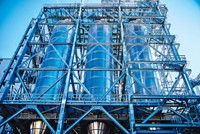Advertisement
Grab your lab coat. Let's get started
Welcome!
Welcome!
Create an account below to get 6 C&EN articles per month, receive newsletters and more - all free.
It seems this is your first time logging in online. Please enter the following information to continue.
As an ACS member you automatically get access to this site. All we need is few more details to create your reading experience.
Not you? Sign in with a different account.
Not you? Sign in with a different account.
ERROR 1
ERROR 1
ERROR 2
ERROR 2
ERROR 2
ERROR 2
ERROR 2
Password and Confirm password must match.
If you have an ACS member number, please enter it here so we can link this account to your membership. (optional)
ERROR 2
ACS values your privacy. By submitting your information, you are gaining access to C&EN and subscribing to our weekly newsletter. We use the information you provide to make your reading experience better, and we will never sell your data to third party members.
Business
Ineos poised for major European expansion
Planned hikes in propylene and ethylene reflect strengthening market conditions
by Alex Scott
June 15, 2017
| A version of this story appeared in
Volume 95, Issue 25

Ineos has unveiled plans to expand its European petrochemical business by increasing ethylene capacity at its two crackers and building a new propylene plant. Following plans by Borealis and Dow Chemical to increase their European presence, the project indicates renewed confidence in the Continent as a petrochemical hub.
Ineos is considering sites across Europe, including Antwerp, Belgium, for a 750,000-metric-ton-per-year propylene plant based on propane dehydrogenation technology.
Additionally, the firm is planning a total increase in capacity at its ethylene crackers in Grangemouth, Scotland, and Rafnes, Norway, of up to 900,000 metric tons per year. “Collectively, it’s the equivalent of building a new world-scale cracker in Europe,” says Jim Ratcliffe, Ineos’s founder and chair.
Ineos currently produces nearly 4.5 million metric tons of ethylene and propylene across Europe, but it remains the largest buyer of the two feedstock chemicals in the region.
“These expansions and new builds will increase our self-sufficiency in all key olefin products and give further support to our derivative businesses and polymer plants in Europe,” says Gerd Franken, CEO of Ineos Olefins & Polymers Europe.
Ineos’s planned expansion is facilitated by low-cost ethane sourced from shale deposits in the U.S., the firm says. In the past few years, Ineos has invested about $2 billion in ships that carry ethane across the Atlantic to Europe.
“All our assets will benefit from our capability to import competitive raw materials from the U.S. and the rest of the world,” Franken says.
The planned expansion also reflects a generally improved outlook for the European petrochemical industry, says Patrick Kirby, principal analyst for olefins at Wood Mackenzie.
Indeed, prospects for the European chemical industry are brightening, according to a recent report from Moncef Hadhri, chief economist for Cefic, Europe’s largest chemical industry group. Last month, European chemical production reached its highest level in eight years, the result of rising demand from the construction sector and other industries. Chemical prices are also above the previous year’s level for the first time in four years, Hadhri reports.
Borealis disclosed last fall that it was conducting a feasibility study for a propane dehydrogenation plant in Kallo, Belgium, and that it would make a decision on the investment by this month. Borealis tells C&EN that the study “is still ongoing.” Mirroring Ineos’s strategy, Borealis has established contracts to bring ethane from the U.S. to its ethylene cracker in Sweden.
Dow is also expanding its European petrochemical capacity. The firm said last month that it will build a 450,000-metric-ton-per-year polyolefins plant in the region to serve the high-pressure pipe market. The Dow facility will be the first new polyolefins plant Western Europe has seen since the late 2000s.




Join the conversation
Contact the reporter
Submit a Letter to the Editor for publication
Engage with us on Twitter